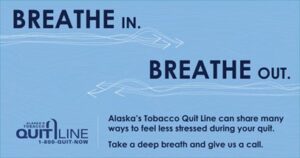April marks Stress Awareness Month. It’s been recognized every April since 1992.1 Stress is a common feeling that most if not all people experience at some point. This post will highlight the relationship it has with tobacco.


Source: Not Buying It Alaska (Facebook)
What Is Stress?1
There isn’t a single definition for stress. The most common explanation is a physical, mental, or emotional strain or tension. It is a reaction to a situation where a person feels anxious or threatened.
Common reactions to a stressful event include:
- Disbelief, shock, and numbness
- Feeling sad, frustrated, and helpless
- Difficulty concentrating and making decisions
- Headaches, back pains, and stomach problems
- Smoking or using alcohol or other drugs
When you experience a stressful situation, specific hormones enter your bloodstream. This leads to an increase in heart rate, blood pressure, and glucose levels. This is helpful in emergency situations. However, having that rush for extended periods can lead to issues, such as heart disease and stroke.
Tobacco and Stress2,3,4
Stress increases the chances that someone decides to smoke. There is a perception that smoking can relive stress because nicotine temporarily releases dopamine (the “feel good” chemical in the brain). Smoking can also create opportunities to connect with other people and provide a distraction from stressful situations.
However, studies show that smoking can create or aggravate stress and lead to negative coping strategies. Nicotine withdrawal can cause stress-like symptoms, such as anxiety, anger, frustration, and irritability. Over time, it can take more nicotine to create the same good feeling and deal with the symptoms of withdrawal.
Some specific statistics around tobacco and mental health/stress include:
- 1 in 5 adults experience mental illness every year. However, about 1 in 3 of all cigarettes smoked in the U.S. are smoke are by adults with some form of mental illness.
- 1 in 6 of those aged 6-17 experience a mental health disorder
- 81% of 15–24-year-olds who used e-cigarettes said they started to decrease
- Stress
- Anxiety
- Depression
- About 50% of frequent vapers (vape 20+ days/month) say the need to vape to cope with stress or anxiety
- Frequent vapers are 2x more likely to say it’s okay to vape for stress relief. Similar trends were seen from those who vaped at any point in the past month.
Quitting smoking can improve mental health. Positives include:
- Quitting cigarettes has been linked to lower levels of
- Anxiety
- Depression
- Stress
- Quitting cigarettes is also linked to improved quality of life and positive mood
- 90% of those who quit e-cigarettes felt less stressed, anxious, or depressed
- 47% of those who quit vaping said they felt more in control when they quit


Source: Alaska State Quitline
Healthy Ways to Manage Stress1
- Recognize what you do and do not have control over. Avoid giving attention to situations you cannot control
- Eat healthy
- Exercise regularly
- Get plenty of sleep
- Give yourself a break if you feel stressed
- Maintain healthy relationships and talk with someone you trust
- Journal
- Meditate
- Avoid drugs and alcohol
- Recognize when you need more help. Talk with a psychologist, social worker, or counselor when you need it
- If you’re experiencing thoughts of suicide or are dealing with intense emotions: call or text 988 or visit the Suicide and Crisis Lifeline website.
Some may be easier said than done. Find what works for you and utilize whatever that is. Note: some may not be appropriate for every situation. For example, going for a run during a big test or job interview instead of before or after.
I Want to Quit
- Call the Alaska State Quitline at 1-800-QUIT-NOW. You can also text READY to 200-400.
- Teens can visit Live Vape Free or Not For Me. Prefer texting? Text VAPEFREE to 873373.
- Veterans can call the VA’s Quitline at 1-800-QUIT-VET
- American Lung Association: resources for quitting smoking for adults and teens. Also provides information for those who want to support someone in their quit journey.
- For more information and tips, check out smokefree.gov.
Experiencing Thoughts of Suicide or Intense Emotions
- Call 988. You can also visit the Suicide and Crisis Lifeline
- Text the Crisis Text Line. Text “Home” to 741741
- LGBTQ ? Connect with the Trevor Project:
- Call: 1-866-488-7386
- Text: 678-678
- Webchat: We’re here for you Now | The Trevor Project
- Need answers to questions, support, or next steps? Connect with NAMI:
- Call 1-800-950-NAMI (6264)
- Text “Helpline” to 62640
- Email helpline@nami.org
I Want to Help Someone Quit
Healthcare professionals
- Ask, Advise, Refer to Quit Don’t Switch (lung.training): free, one-hour, on-demand course that touches on tools and strategies for conducting an effective brief tobacco intervention with those who use tobacco. This course is accredited for 1 hour of Continuing Medical Education (CME) by Rehoboth McKinley Christian Health Care Services (RMCHCS) and 1 Continuing Education Unit (CEU) by the American Association of Respiratory Care.
- ACT to Address Youth Cessation (lung.training): free, one-hour, on-demand course that touches on ways to provide a brief intervention for teens who use tobacco. School personnel and community members in youth/adolescent supportive roles are welcome to take this as well.
Anyone Who Wants to Help
- Help Someone Quit Smoking | American Lung Association: check out tips to support someone in their quit journey.
- TalkAboutVaping.Org:parents/caregivers/any adult who are interested in talking to kids about vaping.
References
- April is Stress Awareness Month – The American Institute of Stress
- Perceived stress and smoking-related behaviors and symptomatology in male and female smokers – PMC (nih.gov)
- Nicotine use and stress (truthinitiative.org)
- Mental Health By the Numbers | NAMI: National Alliance on Mental Illness
- Colliding Crises: Youth Mental Health and Nicotine Use (truthinitiative.org)



